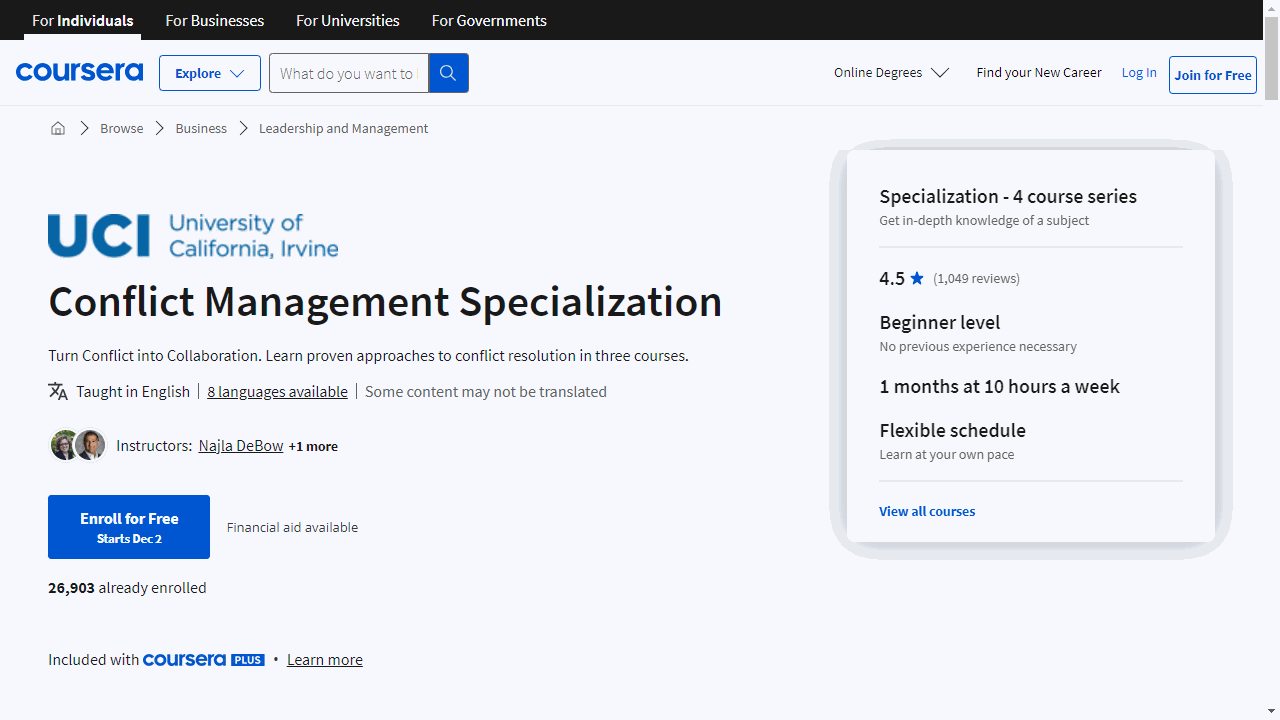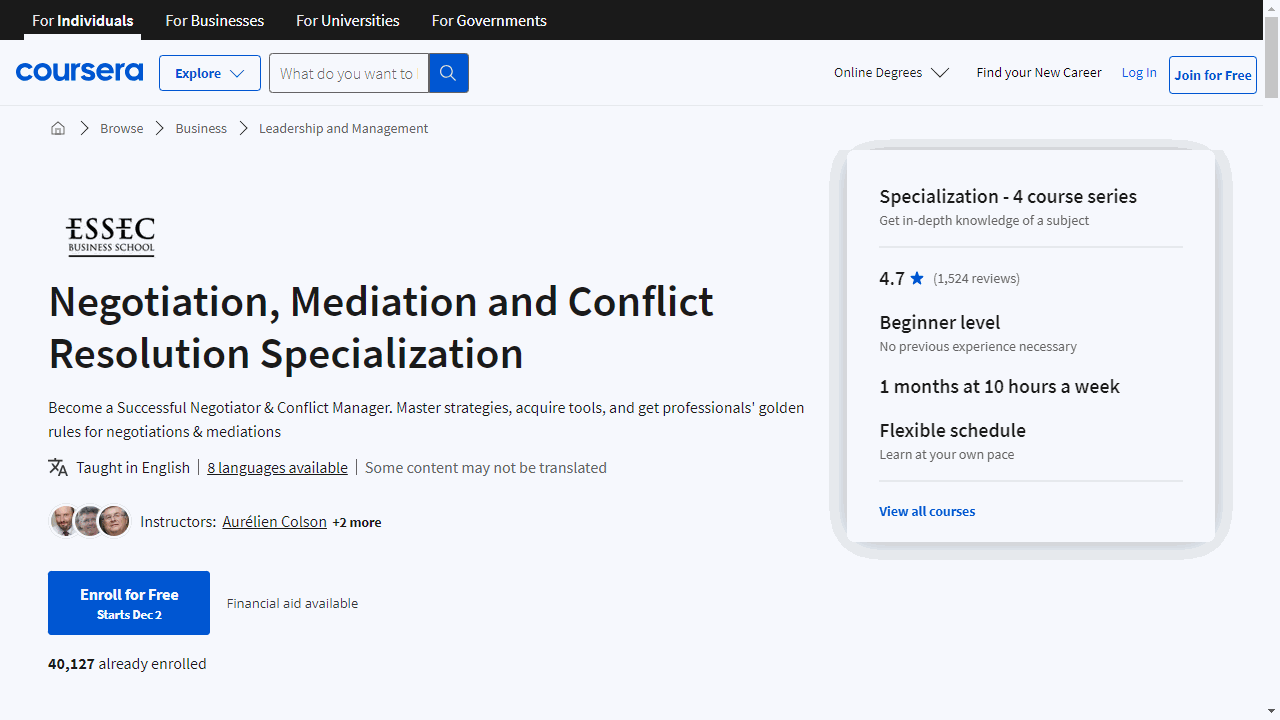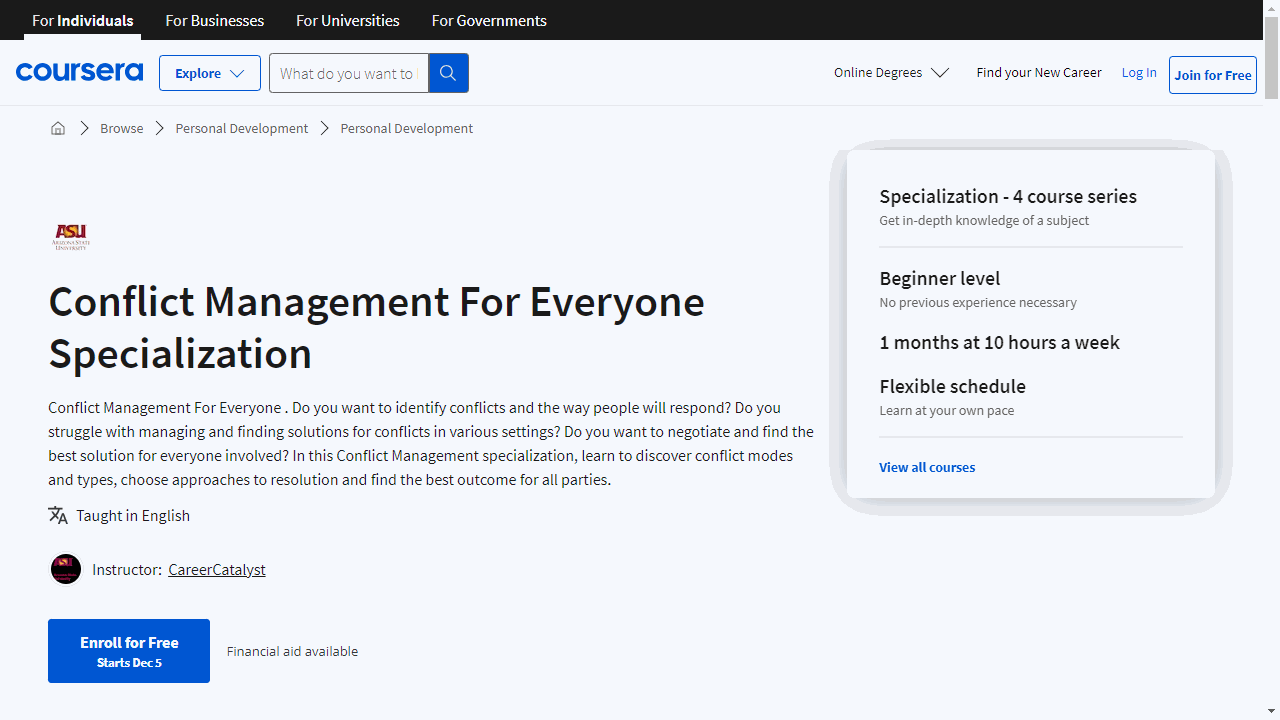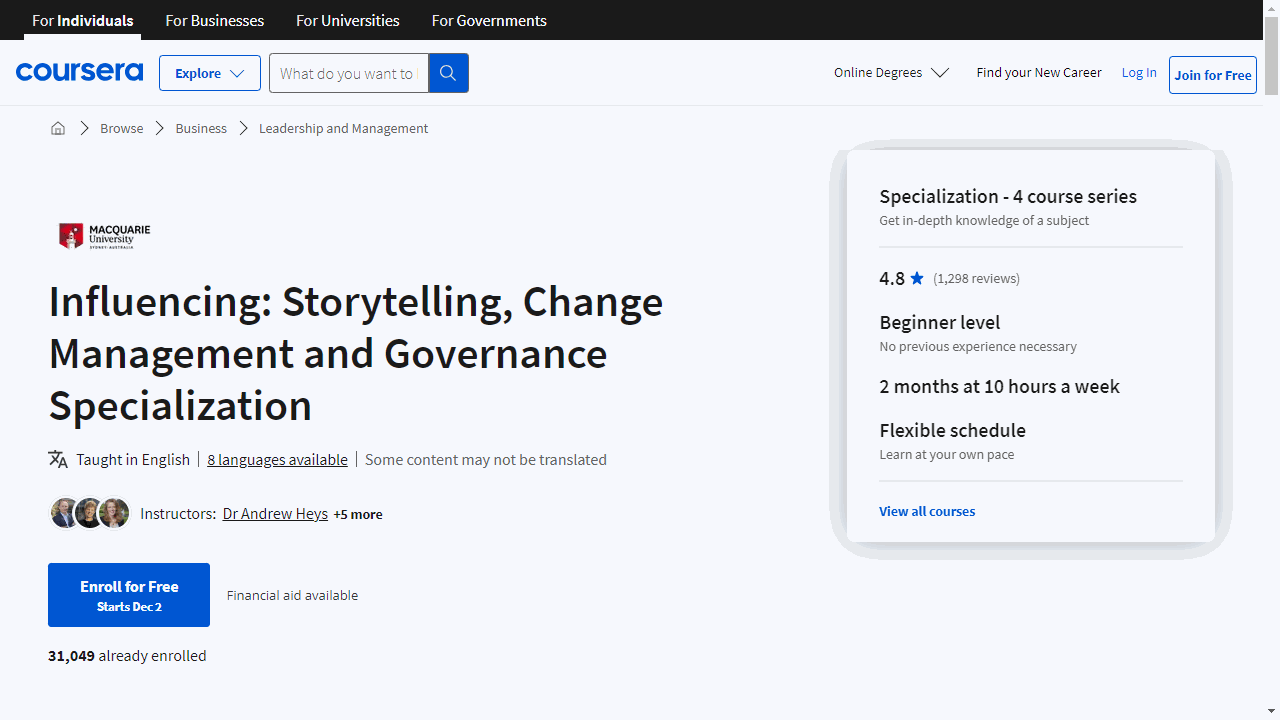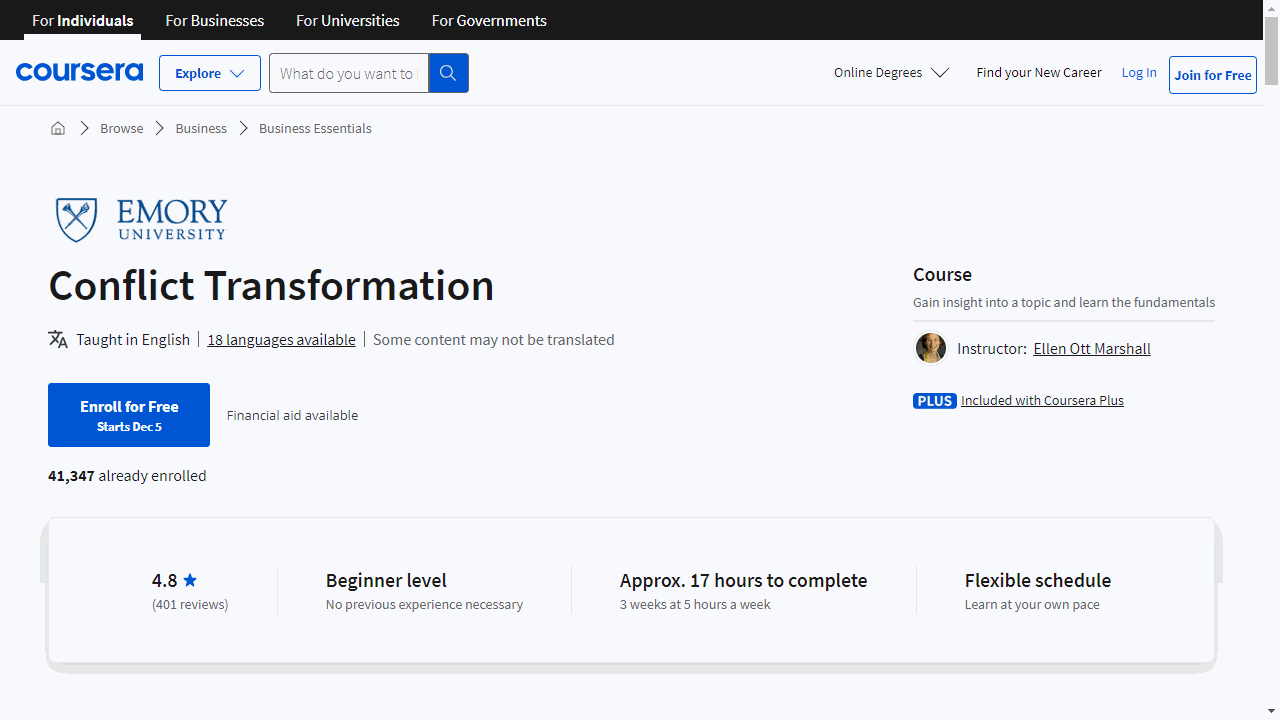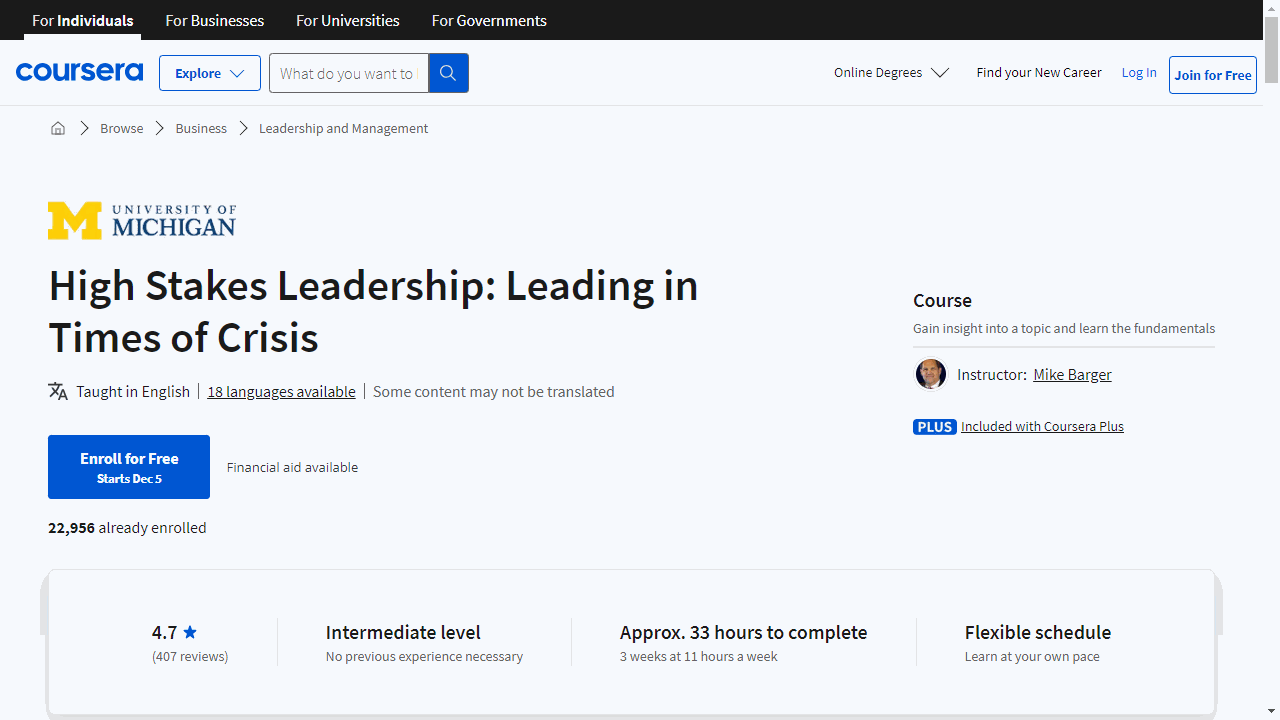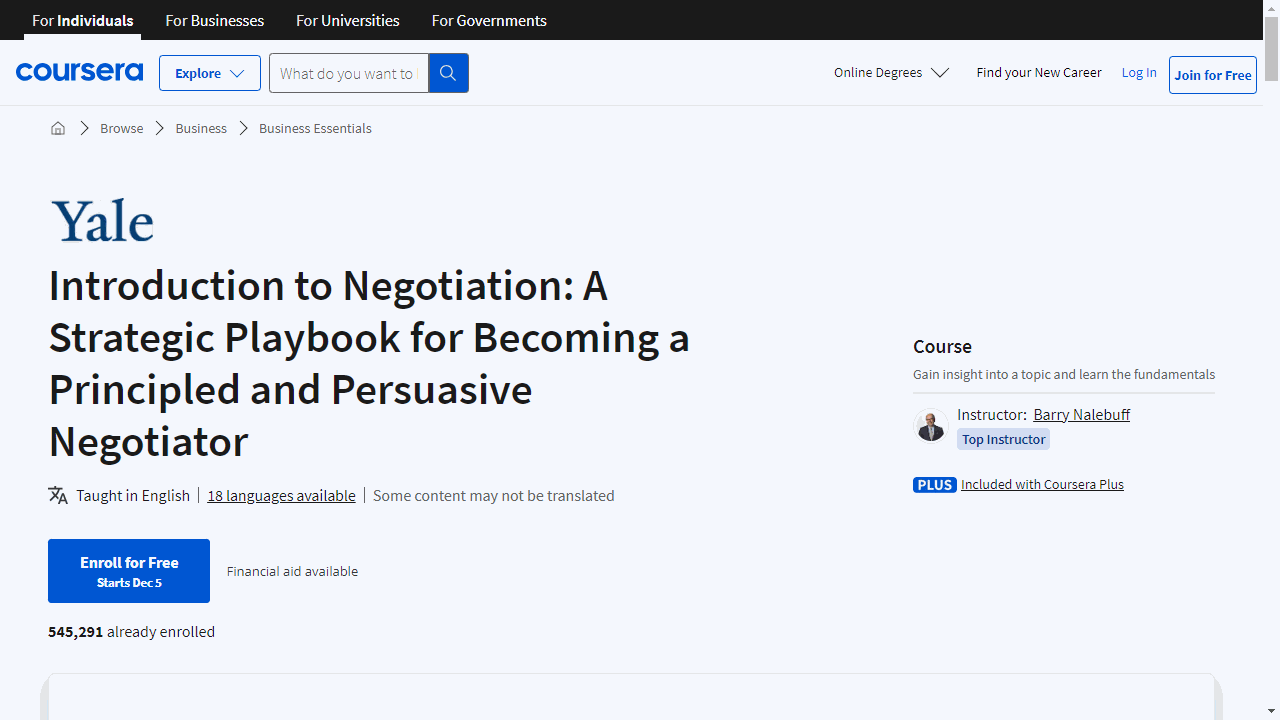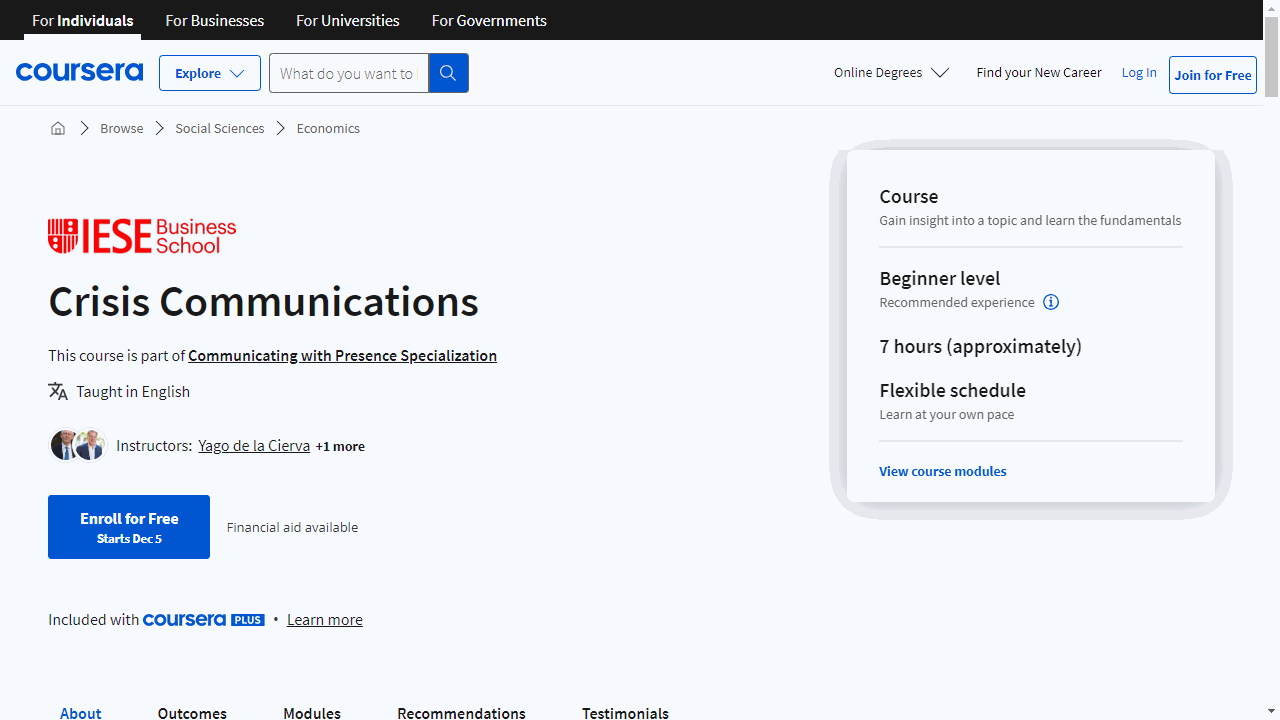Conflict resolution is a valuable skill in both personal and professional settings.
Whether you’re navigating workplace disagreements, resolving family disputes, or negotiating business deals, knowing how to manage conflict effectively can make a significant difference.
However, finding the right course to learn conflict resolution can be a daunting task, especially with so many options available.
You might be looking for a course that covers essential principles, practical strategies, or maybe you want to delve deeper into specific conflict types.
For the best conflict resolution course overall on Coursera, we recommend the Negotiation, Mediation, and Conflict Resolution Specialization by ESSEC Business School.
This specialization is highly regarded for its comprehensive coverage of negotiation, mediation, and conflict resolution techniques.
You’ll learn how to prepare for negotiations, navigate through deadlocks, and achieve mutually beneficial outcomes.
You’ll also delve into international and cross-cultural negotiation, understanding the impact of cultural nuances on negotiation strategies.
While the ESSEC Business School Specialization is a great starting point, there are plenty of other conflict resolution courses on Coursera.
If you’re looking for a more focused approach, we have recommendations for courses that emphasize communication skills, intercultural conflict management, and more.
Keep reading to find the perfect conflict resolution course for your needs!
Negotiation, Mediation and Conflict Resolution Specialization
This specialization is offered by the ESSEC Business School, a top-ranked French business school.
In “Negotiation Fundamentals,” you’ll acquire practical tools to prepare for negotiations, structure effective sequences, and navigate through deadlocks.
This course emphasizes creating sustainable partnerships, moving beyond a win-lose mindset to achieve mutually beneficial outcomes.
“International and Cross-Cultural Negotiation” takes you across the globe, enhancing your understanding of cultural impacts on negotiation.
You’ll learn to recognize and adapt to cultural nuances, improving your negotiation flexibility and strategy when dealing with international partners.
“Mediation and Conflict Resolution” equips you with the skills to lead mediation processes and resolve workplace or international conflicts.
It builds on negotiation fundamentals, introducing you to various mediation types and strategies to address common challenges.
The capstone project is where theory meets practice.
You’ll analyze real-life negotiations, engage in peer negotiations, and simulate mediation scenarios.
This hands-on approach solidifies your learning and prepares you for real-world application.
Each course is rich with expert videos, interactive content, and practical case studies, ensuring a comprehensive learning experience.
Conflict Management Specialization
This series of courses from the University of California, Irvine will equip you with the tools to navigate and resolve conflicts effectively.
You’ll master assertiveness, active listening, and effective communication, positioning you to handle conflicts in any setting with confidence.
Dive into “Types of Conflict” to understand that not all disagreements are detrimental.
This course will help you identify various conflict types and discover how to transform them into positive outcomes.
Through engaging video lessons, case studies, and interactive quizzes, you’ll learn to embrace and manage conflict constructively.
In “Conflict Resolution Skills,” you’ll develop the ability to ensure your voice is heard and to listen actively to others.
This course hones in on strategic communication techniques and equips you with a practical conflict management plan, enhancing your ability to achieve amicable resolutions.
“Intercultural Communication and Conflict Resolution” prepares you for the global stage, where interactions across cultures are commonplace.
You’ll gain insights into avoiding cultural misunderstandings and learn strategies for successful communication in diverse settings.
The capstone, “Conflict Management Project,” allows you to apply your knowledge by analyzing and resolving a specific conflict.
You’ll create a comprehensive case study and develop an integrated action plan, showcasing your ability to apply communication skills and concepts learned throughout the specialization.
Conflict Management For Everyone Specialization
This specialization is offered by Arizona State University.
Each course is tailored to equip you with specific skills to navigate and resolve conflicts effectively.
In “Assessing Conflict,” you’ll learn to spot conflicts early and understand various reactions.
Skills like active listening and strategic questioning will help you pinpoint the heart of conflicts, setting the stage for resolution.
“Managing Conflict” offers strategies for addressing disputes across different communication channels.
You’ll learn to adjust your conflict mindset and tackle confrontations whether they occur face-to-face, on a call, or through email.
The “Negotiation” course sharpens your preparation and strategy for negotiations.
You’ll gain insights into crafting offers and counteroffers, ensuring you can navigate negotiations toward mutually beneficial outcomes.
Lastly, “Resolving and Transforming Conflict” focuses on creating and implementing lasting solutions.
It teaches you to approach conflicts cooperatively and respond effectively, ensuring that resolutions stick.
By diving into these courses, you’ll develop a robust set of skills for managing and resolving conflicts in any area of your life.
Influencing: Storytelling, Change Management and Governance Specialization
This specialization is tailored to enhance your ability to lead, negotiate, and communicate with authority.
It’s offered by Macquarie University.
Dive into “Leading transformations: Manage change” to refine your approach to organizational change.
You’ll learn to craft change initiatives and navigate the complexities of transformation with a strategic mindset.
This course equips you with the tools to lead change effectively, ensuring you’re prepared to influence outcomes positively.
Sharpen your conflict resolution skills with “Negotiation skills: Negotiate and resolve conflict.”
This course empowers you to dissect and navigate organizational politics, equipping you with strategies for successful negotiations.
You’ll emerge with the ability to manage conflicts and negotiate with confidence, a vital skill in any professional setting.
“Storytelling and influencing: Communicate with impact” is designed to boost your persuasive communication.
It’s not just about speaking; it’s about making a lasting impression.
You’ll explore how to tailor your message, engage your audience, and drive your points home, ensuring your vision is not just heard but embraced.
Finally, “Risk governance: Manage the risks” focuses on the essentials of organizational governance and risk management.
You’ll analyze governance structures, apply risk management principles, and tackle ethical dilemmas.
This course prepares you to foster an environment where every team member is aligned with serving the organization’s stakeholders.
Each course is interactive, featuring video lectures and practical assessments to solidify your learning.
Conflict Transformation
This course from Emory University isn’t just about quelling disputes; it’s about turning them into opportunities for growth.
From the start, you’ll dive into the heart of conflict transformation, learning how conflicts can be layers of issues within issues.
You’ll explore nonviolent resistance and how to foster positive change without aggression, linking these concepts to current events.
The course also focuses on self-awareness, helping you identify your personal conflict style from five distinct types.
Understanding whether you’re a peacekeeper or a problem solver, for example, can significantly improve how you navigate disagreements.
You’ll delve into the science behind conflict, examining how your brain and body react during tense situations.
This knowledge is crucial for managing your responses and maintaining composure.
By week three, you’re equipped with practical tools like the ABC, Onion, and Tree Tools, designed to dissect and resolve conflicts at their core.
These methods are more than theoretical; they’re actionable strategies you can apply in real-life scenarios.
Mediation skills are a key component of the course.
You’ll learn the mediator’s role and the phases of the mediation process through demonstrations, preparing you to facilitate resolution between others.
For those sudden or persistent conflicts, the course provides strategies to address and defuse them effectively.
You’ll learn to identify underlying issues and design processes to tackle difficult disputes head-on.
Throughout the course, weekly readings and historical reflections enrich your understanding, while a comprehensive bibliography offers resources for further exploration.
High Stakes Leadership: Leading in Times of Crisis
This course from University of Michigan is packed with practical lessons on navigating crises and resolving conflicts effectively.
You’ll start by examining case studies like the Deepwater Horizon disaster and JetBlue’s operational crisis to understand the critical role of perspective in leadership.
You’ll learn to identify your stakeholders and craft a Stakeholder Engagement Manifesto, ensuring you keep key people informed and involved during turbulent times.
Communication strategies are a focal point, with insights on how to manage information flow during a crisis, drawing from real-life examples like the COVID-19 pandemic response.
The course emphasizes organizational resilience, teaching you to anticipate challenges, cope with adversity, and strengthen stakeholder relationships post-crisis.
You’ll gain skills in predicting stakeholder reactions, which is essential for crafting effective communication plans and preventing conflicts.
The course also includes interactive experiences, allowing you to practice employee engagement—a vital component of conflict resolution.
Understanding different crisis types and crafting a typology will help you quickly identify and respond to various challenges.
Leadership skills are honed through lessons on decision-making with limited information, multi-audience communication, and acknowledging vulnerability.
Preparation for future crises involves learning about response strategies, defining roles, and conducting readiness exercises like tabletop simulations.
You’ll be encouraged to reflect on your experiences and develop a personal crisis leadership philosophy, leaving the course with a clear action plan to enhance your organization’s crisis preparedness.
Introduction to Negotiation: A Strategic Playbook for Becoming a Principled and Persuasive Negotiator
This course by Yale University takes you from the foundational concepts to advanced negotiation strategies.
You’ll start by learning about “the Pie,” which is key to understanding what’s at stake in any negotiation.
Through engaging examples, like splitting a limo fare or historical anecdotes, you’ll see how to identify and expand the resources available for division.
The course introduces you to problem-solving tools like the Shapley Value, helping you ensure fair outcomes.
While there’s some math involved, you’re given a heads-up, allowing you to prepare or opt-out as needed.
Practical exercises are central to the curriculum.
You’ll engage in the Ultimatum Game to witness negotiation dynamics firsthand and explore BATNA to determine your walk-away point.
The concept of ZOPA will also be a focus, teaching you to identify the range where agreements can be reached.
Real-world simulations, such as the Zincit case, provide hands-on experience.
You’ll negotiate, record, and analyze your discussions, gaining insights into effective strategies and common pitfalls.
The course also addresses the nuances of negotiation, including how to manage deception and maintain control.
You’ll learn the power of strategic silence and how to navigate complex scenarios like real estate transactions or salary discussions.
Special attention is given to negotiation challenges unique to women, offering strategies to boost confidence and effectiveness.
Interactive webinars complement the course material, allowing you to clarify doubts and learn from peers.
Crisis Communications
This course from IESE Business School teaches you how to manage crises effectively, maintain composure, and protect your reputation in the face of conflict.
It begins with an introduction to crisis management, setting the stage for what’s to come.
You’ll then explore the Six Principles of Crisis Management, providing a strategic framework to navigate any crisis confidently.
Learning how to convene a crisis team is next, where you’ll identify key players and their roles, ensuring effective collaboration during high-pressure moments.
Strategy development is crucial, and this course teaches you to make swift, informed decisions to steer through turmoil.
You’ll also master the structure of corporate responses, ensuring your communication is clear and coordinated.
The course includes practical sections like Errors and Corrections, and How to Intervene in a Controversy, offering guidelines for rectifying mistakes and engaging in disputes constructively.
Ethics in Media is also covered, emphasizing the importance of integrity in your crisis management approach.
Interactive elements like Single and Multiple Choice Questions allow you to test your understanding, and the community forum provides a space for support and discussion with fellow learners.
The course concludes with a wrap-up video, reinforcing the key concepts and strategies you’ve learned.
